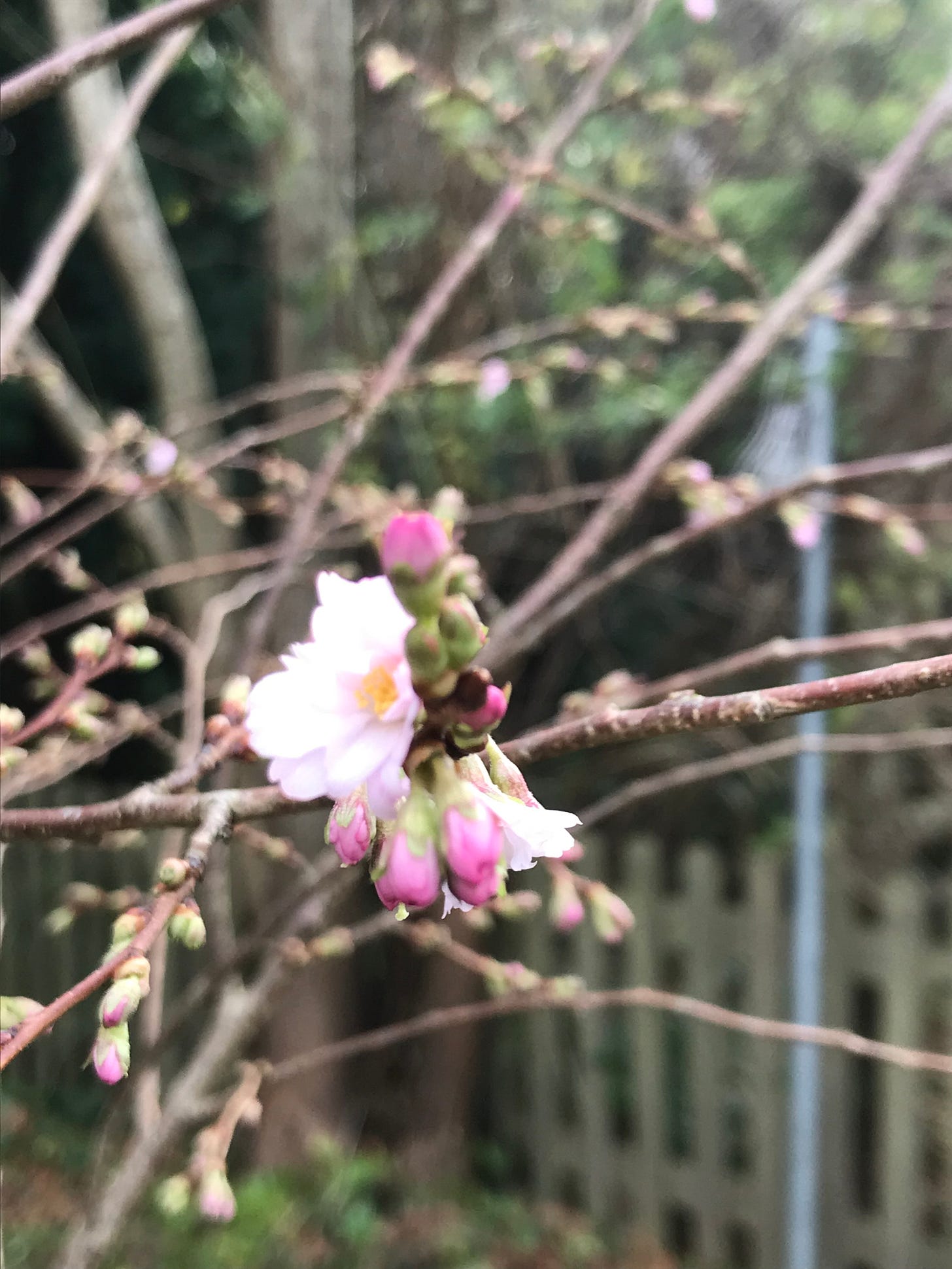Light
the longest night, muted joy, and active hope
From today the days get longer and the nights get shorter. If you live with health conditions, pain, illness, and disability, and even if you don’t, life can feel especially sucky when it’s also cold and wet and dark outside. As an attempt at an antidote to some of this, I wanted to offer some festive joy. I hope it is joyful. I am attempting to summon joy while conscious I am also presently feeling distinct periods of un-joy.
Today is the shortest day of the year, the Winter Solstice. It is the day that, in the Northern Hemisphere, we are the furthest away from the Sun. Earlier in the week I had started writing a post about Christmas, thinking about (for those who celebrate) how difficult it can be living with, and managing, disability and chronic illness with all the pressures and expectations of (and for) the festive season, on top of living through an ongoing pandemic, and the cold and the dark outside. One of the things I have had to do, and continue to learn, is the need to abandon expectations. It is not a ‘letting go’ for me, that sounds like a gentle conscious decision, it is a total abandonment. This is the case during the lead up to Christmas but also further afield. It means anything achieved becomes a surprise. Trying to do something involves pushing myself, and this does not have a good relationship to my body, it is invariably costly. This year I have written some cards and posted them on time to reach people before Christmas Day. This is more than I have usually done by now in recent years. It may be more than I do in future years too. It is a happy accident of time.
So as not to fall into the slipperiness of forcing faux joy for this post, I am aiming for muted joy, I hope I have set the scene - a modestly hopeful end to the year, relief perhaps that it is at last the end of the year. I am mentally juggling many complicated thoughts and feelings as I imagine you might be too. I hope you can enjoy some simple thoughts on light and joy as we collectively grapple also with loss and grief in so many different places around the world, individually and shared.
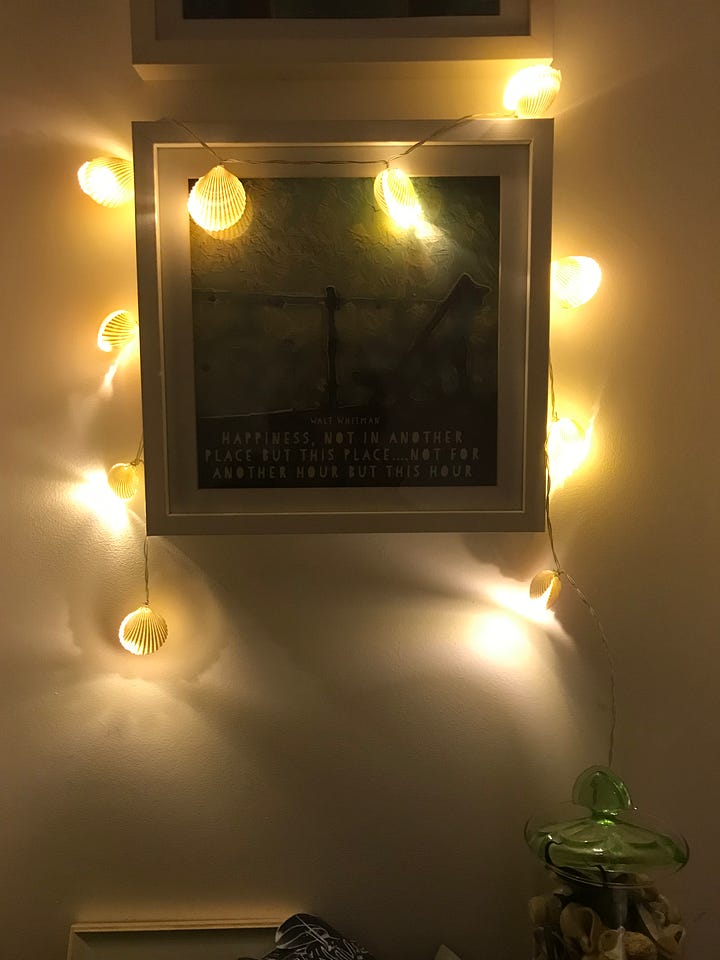
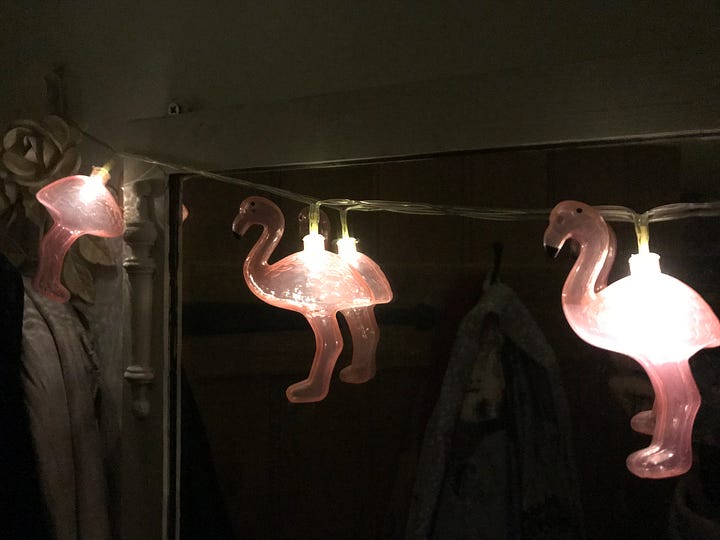
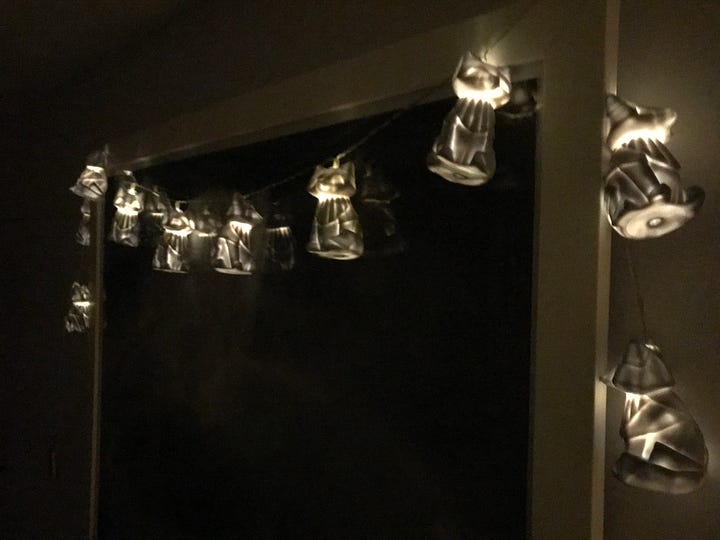
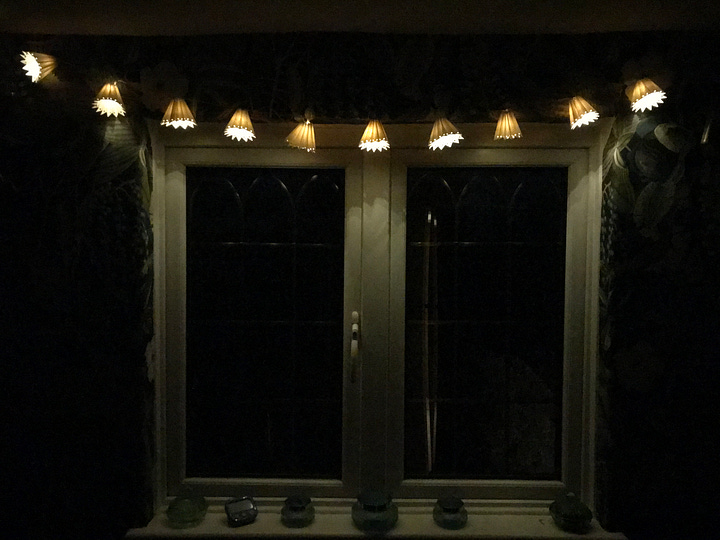
The shortest day invites a bringing in of the light, and I particularly enjoy the small delights of twinkly fairy lights in the darkness at this time of year. I shall also light candles, and will think of loved ones who have died, and are at distance, for whom it feels like a special time of the year, one of those thin places and times, of memory and connection.
Without the complications of expectations, I also feel oddly freed up in the last couple of weeks of December - a peculiar permission to do less and rest more, simply because I know everyone else is (or at least everyone who is entitled to paid leave and does not work in the service industry or have caring responsibilities). This is an ongoing strangeness I shall continue to be perplexed by, but certainly I continue to feel that pull and pressure to ‘do’ and be productive during the week, even when my life is not governed by a 9-5 routine and I can (in theory at least) set my own pace. When I am not and can not, the guilt and stress is greater Monday to Friday. The week after Christmas however, has a special quality of time that makes it all the more elastic. I will attempt to carry this regard for time and rest over into the new year, as I try again to practice resting more, and to be more considered about what rest is and can be. One of the books I’m listening to currently is Tricia Hersey’s Rest is a Radical Act, her work is seeking to decolonise and redress the balance of rest, of western ideals, pressures, and celebrations of productivity. For so many of us, rest is a crucial part of managing and recovering (as well as we might) with illness, and simply living in disabled bodies as best we can.
As well as the light and the shedding of expectations and pressure, I have also been able to get outside this week (and as I write this I wonder if these things are not unconnected). Today I met some new sheep. There are some familiar sheep I visit semi-regularly who live at the end of the lane, but these are sheep I have not met before, I was excited to make some new sheep friends. They look less excited about meeting me.
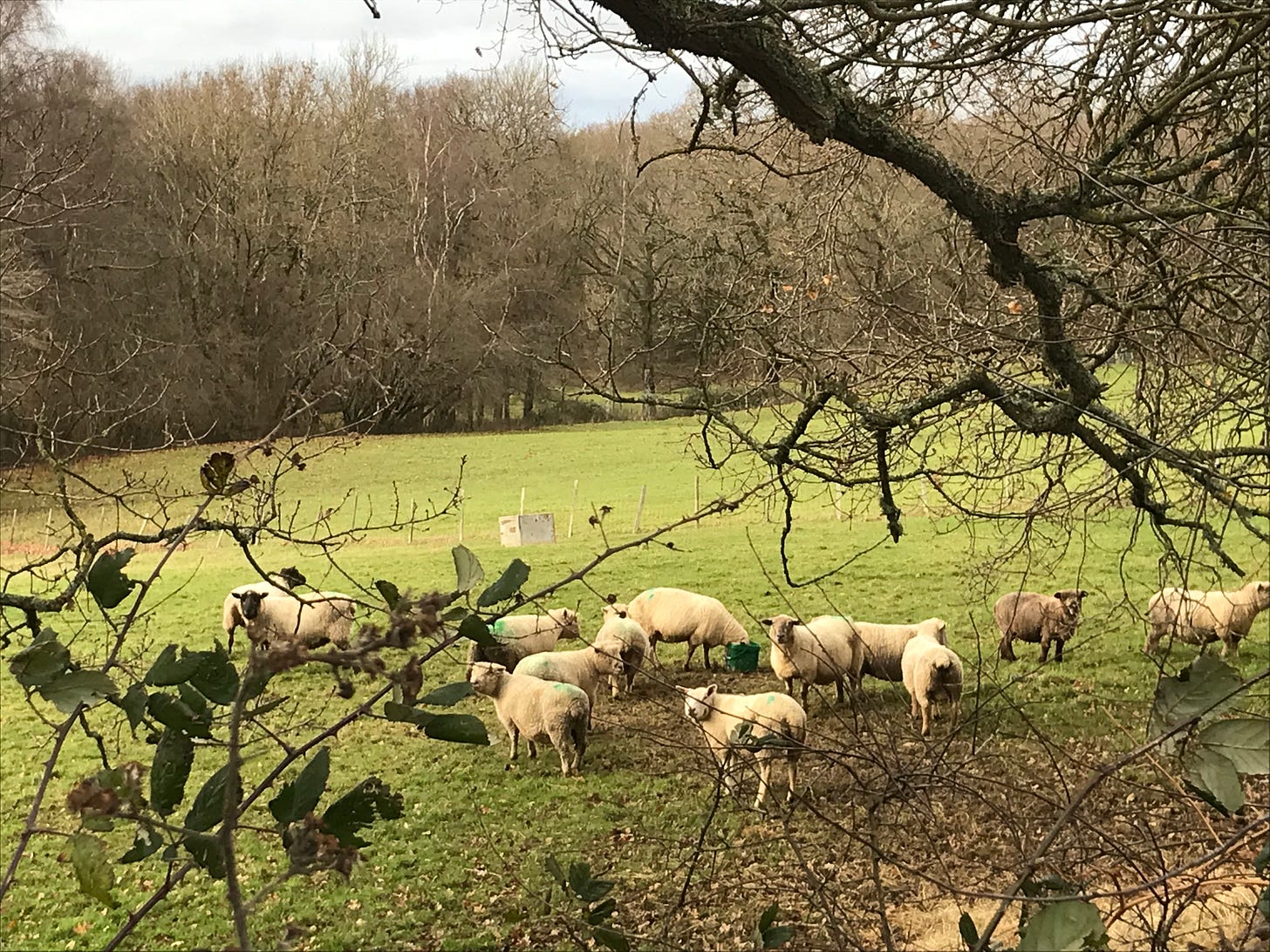
As well as noticing the sheep, there are things stirring again above ground in my garden, amongst the bare branches and fallen leaves. When I first moved in to where I now live three years ago, I planted a winter flowering cherry tree. While everything else is dying or dormant, the pale pink blossom of the tree is again starting to open.
Encountering end of year book lists, the lovely folk at Lighthouse Books in Edinburgh have included the Moving Mountains anthology in their shortlist of ‘Active Hope’. My slightly enlarged, ectopic beating heart, did an extra jump spotting this on instagram, and the warmth and comfort I hope it is sharing with others, as well as the change it will carry out into the world, is definitely warranting more than muted joy.
My hope for the coming year is also for the ethos of Moving Mountains to continue, and for change to come, to connect with others doing similar work and for the ripple of change to be shared further afield too. There are some brilliant people and projects doing wonderful things towards this. In particular I wanted to share a short video that highlights the work of one project in Bristol that connects the outdoors and nature, with disability. The Garden Lab Whispers Grow project shared a video on social media this week. It’s just a few minutes long, and shows some of their work - there’s more information on their website, but in the film are statements and questions that made me smile to the point of prickly nosed tears. They are doing wonderful things like creating batteries from the soil to show the activity and life that happens beneath the ground, as well as asking things like: ‘What if you could just rest and not ‘do’? What would you discover if you did that?’ What if? Another point made is that the allotment is presently inaccessible to wheelchairs, and thus to one of the participants in the group, and the question is ‘what is the allotment missing’ with Olly not being there, and it made me wonder again, what would happen if everything and everyone spun ableism on its head, and centred accessibility, what could the world be like if we considered those so often excluded and marginalised first instead of last? Projects like The Garden Lab give me more hope for 2024, and joy for what the future could be (and is), and I hope, along with some twinkly lights, they do you too.
Earlier this year, I ran a workshop with CHASE Medical Humanities Research Network on darkness. If you are looking for writing suggestions, or something to mull over thoughts on light further with, I was prompted by Susan Sontag who also connects illness as the ‘dark side of life’ in her book Illness as Metaphor. Some of the themes to my workshop included the following, feel free to use them as writing prompts if you are wanting something particular to write to:
What does the night represent to you? What does it mean for something to happen at night as opposed to during the day? How does the darkness of the night alter our perspective and our sense of the world, or our sense of ourselves?
Explore your own experiences of illness as nocturnal, holding a torch up to the little seen, tracing the silhouettes and shadows of nightfall.
It is only in darkness that we see the light of the candle. And what of the white nights, the nights where it does not get dark?
If you are reading this, you may be more familiar with the substack platform and those who write here than me. I am still very new with much to learn and catch up with. If you are new too, you can take a look at the other posts I’ve published on the website, if you click through from the email, where you can access upcoming events and recordings - there’s a new event to book for January for example, when I am ‘in conversation’ with Joanne Limburg, along with Victoria Bennett and Nic Wilson, with a focus on memoir, illness and disability, and the value of writing. If you are interested in finding new reading and have extra time to explore over the next couple of weeks, I would like to share the work of some of the people who have been especially kind to me since my arrival, and who’s writing (if you haven’t already) you might like to take a look at too. Thank you to Lindsay Johnstone, who writes What Now?, Yasmin Chopin and her Place Writing blog, and Emily Bazalgette at GriefSick. I’m looking forward to further connections and reading and writing with you in the future.
As a final offering of light to explore, if reading and writing is covered, or just too much just now, the volcanoes of Iceland currently have live links you can watch online from - Grindavík is currently active.
Do share your thoughts of joy (and muted joy), and hope (and active hope) in the comments if you would like to, I’d love to read them. Happy Winter Solstice, the light is coming.


